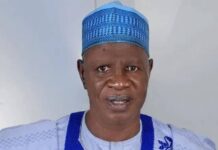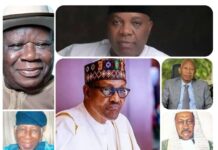This piece is a corollary to the 4-series article, which appeared in this column in the month of July 2019 titled “Nigeria, Creativity in Nigerians and the Missing Link”. In that article, I chronicled an uncountable number of Nigerians who excelled in their chosen careers home and abroad with several of them being democratically elected in positions of leadership in the diaspora.
It was clear that Nigerians are naturally gifted with unlimited ingenuity, resourcefulness, capacity and making waves in all nooks and crannies of the seven continents of the World. The article also serialized the unlimited natural resources spreading over the 36 states and FCT waiting to be explored and exploited. And then, the missing link, which can perfect make connection between the country and this special breed of Nigerians to galvanize the country match to Eldorado. The article can be accessed via https://breakthroughwithmkothman.blogspot.com/2019/08/nigeria-creativity-in-nigerians-and_23.html
It is within the context of Nigerians excelling in all spares of human endeavors that the recent election of Professor Mohammed Tijjani Bande as the president of the 74th session of the United Nations General Assembly becomes imperative for discussion. Professor Bande is the second Nigerian and ninth African to occupy this pinnacle position of the president of the UN General Assembly.
The first Nigerian was Major General Joseph Nanven Garba, a general in the Nigerian Army, a consummate diplomat, and politician who served as president of the UN General Assembly from 1989 to 1990.
While most presidents of the UN GA presided over one meeting, General Garba presided over four different meetings of the UN General Assembly during his tenure. The meetings were Forty-fourth, Sixteenth special, Seventeenth special and Eighteenth special in 1990. From 1946 when the UN General Assembly was formed to the year 2019, there were a total of 74 Presidents were elected from different member countries of the UN. Nine of these presidents came from Africa with Nigeria having two out of these nine. Nigeria is one of the only three countries that had its citizens elected as President of the UN General Assembly twice. The other two countries are Argentina and Ecuador. The rest of the member states had been represented only once by their citizens holding the office.
UN General Assembly is an important session scheduled for every year starting in September, which is considered to be the beginning of UN activities for the year, the president so elected to preside over meetings —any special, or emergency special, assemblies over the period of one year until another General Assembly where new President is elected. The General Assembly meets annually in regular session, intensively from September to December, and resumes in January until all issues on the agenda are addressed. The General Assembly holds in New York where 193 member states meet annually.
The presidency rotates annually between the five geographic groups: African, Asia-Pacific, Eastern European, Latin American and Caribbean, and Western European and other States. Contestants are considered from the group that has a turn to produce a President for the session.
The General Assembly is one of the six main organs of the United Nations, the only one in which all Member States have equal representation: one nation, one vote. Thus, all the 193 Member States of the United Nations are represented in this unique forum to discuss and work together on a wide array of international issues covered by the UN Charter, such as development, peace, and security, international law, etc.
The election is strictly observed in line with rule 30 of the UN General Assembly that states “Unless the General Assembly decides otherwise, the General Assembly shall elect a President and twenty-one Vice-Presidents at least three months before the opening of the session over which they are to preside. The President and the nine Vice-Presidents so elected will assume their functions only at the beginning of the session for which they are elected and shall hold office until the close of that session. [Rule based directly on a provision of the Charter (Art. 21, second sentence)]. The Vice- Presidents shall be elected after the election of the Chairmen of the six Main Committees referred to in rule 98, in such a way as to ensure the representative character of the General Committee”
Perhaps, the UN General Assembly is the second most important organ of the UN after the UN Security Council. However, no permanent members of the United Nations Security Council ever serve as UN General Assembly president, conceivably because of their powerful stature globally. There are five permanent members of the UN Security Council; the People’s Republic of China, France, Japan, Russia, the United Kingdom, and the United States, they are the most powerful countries that formed the pillars of the UN. Now who is Prof. Bande and what are the implications of a Nigerian occupying this important position?
Prof. Bande was born 62 years ago in Zagga town, Kebbi State, where he started his educational career. Bande is an Alumnus of the famous Ahmadu Bello University Zaria where he did his undergraduate program and obtained BSc (Political Science) in 1979 before he proceeded to Boston University, where he graduated with a Master of Arts in Political Science in 1981. Thereafter, Prof. Bande crossed over to Canada where he successfully completed his Ph.D. program in Political Science at the University of Toronto in 1987.
Prof Bande started his working career at Usman Danfodio University, Sokoto as a graduate assistant in the early 1980s and rose to the rank of professor in 1998 at the same institution. In the year, 2000, Prof Bande went on a leave of absence to Tangier, Morocco where he served as the Director-General of the African Training and Research Centre in Administration for Development from 2000 to 2004.
At the end of his tenure, He came back to Usman Danfodio University and served as the Vice-Chancellor between 2004 and 2009. After his tenure as Vice-Chancellor, he was appointed as the Director-General of Nigeria’s National Institute for Policy and Strategic Studies, Kuru, Plateau State. He served NIPSS Kuru from 2010 to 2016. He was subsequently appointed to serve as the permanent representative of Nigeria to the United Nations.
In the same year of his appointment in UN, in 2016, Prof Bande was elected as the Vice-President of the Assembly during her 71st session of General Assembly and served meritoriously that made him one of the outstanding personalities of the UN within the shortest period of two years.
Today, Prof Tijjani Muhammad-Bande is a consummate political scientist, administrator, career diplomat and duly elected as the President of the 74th session of the Assembly. He succeeded María Fernanda Espinosa, whose term ended in September 2019. What is Prof. Bande’s agenda as 74th President of the UN General Assembly?
During his inauguration as 74th President, Prof Bande was quoted as saying “The implementation of the existing mandates and the 2030 Agenda with particular focus on peace and security, poverty and education, zero hunger, quality education, climate action, and inclusion will constitute the major priorities of my presidency”. He added, “I am committed to promoting partnerships that are needed from all stakeholders to achieve our objectives and ultimately ensure that we do our best to ensure peace and prosperity, particularly for the most vulnerable”.
Added to these powerful statements, the UN Secretary-General, Antonio Guterres was hopeful that Prof. Bande would bring “many important and admirable qualifications to the job”. Guterres was further quoted while congratulating the new president saying “As a Nigerian and an African, you have invaluable insights into the continent’s challenges, such as the Sahel and Lake Chad Basin, and more broadly into the challenges our world faces across the three pillars of our work, peace, sustainable development, and human rights,”
The implications to Nigeria of Prof Bande’s elevation to the pinnacle at the UN and his ambitious agenda are; Nigeria must triple her efforts to achieve peace and security, zero hunger, eradicate poverty, improve quality education and make it all-inclusive.
As part of security, Lake Chad Basin needs special attention from all the Lake Chad Basin Countries, which should be championed by Nigeria. Nigeria should squarely take this leadership very serious by focusing to achieve these lofty objectives.
Professor Othman is the Executive Director of the National Agricultural Extension and Research Liaison Services (NAERLS), ABU Zaria.
Follow the Neptune Prime channel on WhatsApp:
Do you have breaking news, interview request, opinion, suggestion, or want your event covered? Email us at neptuneprime2233@gmail.com




